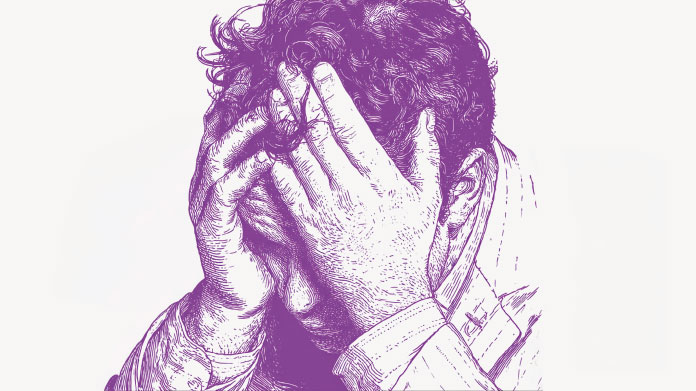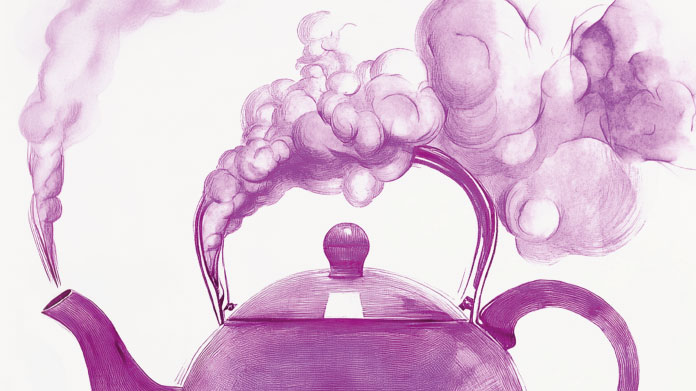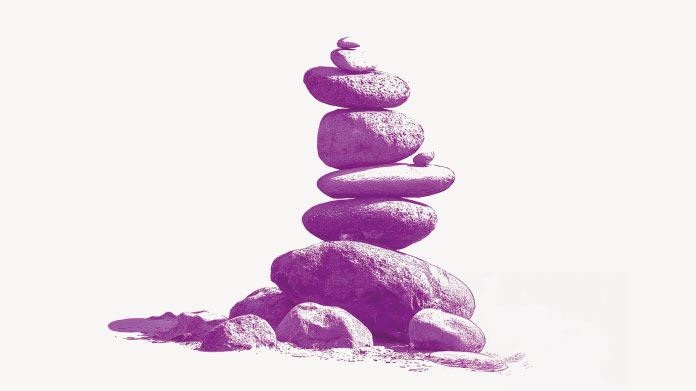8 natural ways to calm an anxiety attack
Your heart’s racing, you have a lump in the throat, and a feeling of dread: though harmless, an anxiety attack is still highly distressing. Here are 8 natural ways to ease these unwelcome episodes.

What exactly is an anxiety attack?
An anxiety or panic attack is an acute manifestation of unease. Often occurring without warning, it produces a range of physical and psychological symptoms: nausea, increased heart rate, shaking, feeling out of control, collapse…
It reaches a peak in around ten minutes before dissipating. Though such attacks primarily affect anxious individuals, the cause is not always identified.
For many of those affected, an anxiety attack is a traumatic ordeal: the mere prospect of repeating the experience creates apprehension which only perpetuates the problem (1).
Cardiac coherence to calm anxiety attacks
The autonomic part of our brain is made up of two antagonistic pathways: the sympathetic and parasympathetic systems. The first prepares us for the ‘fight or flight’ response, while the second activates the ‘rest and digest’ response. These two pathways normally act in harmony.
During an anxiety attack, the sympathetic aspect predominates. ‘Cardiac coherence’ is a simple breathing exercise which corrects this imbalance by slowing down the respiratory and heart rates (2-3).
How is it done? Inhale deeply for 5 seconds, then breathe out slowly for 5 seconds. Continue for several minutes until your heart and brain return to normal.
To maintain a state of calm on a daily basis, some people practise the ‘365’ technique: 3 times a day, they repeat this breathing cycle 6 times per minute for 5 minutes.
Mindfulness to ‘short-circuit’ anxiety
During a panic attack, your thought flow is disrupted. Mindfulness re-focuses your attention on your immediate environment, thus deflecting your anxiety (4).
If you feel a panic attack coming on, try this >5-4-3-2-1 exercise to head it off. Look around you for:
- 5 objects you can see;
- 4 sounds you can hear;
- 3 textures you can feel;
- 2 scents you can smell;
- 1 thing you can taste.
Passiflora to reduce agitation
Passion flower or passiflora (Passiflora incarnata) is a woody plant from central America.
Highly-prized by the Algonquin tribe, it helps induce a state of calm by reducing psychomotor agitation (the feeling of anxious restlessness). It also helps increase the body’s resistance to stress (5). To benefit from its properties, take a supplement based on passiflora extract (such as Stress Relief Formula).
If you have disturbed nights as a result of anxiety, passiflora can also help you get a good night’s sleep(6). It is often combined with other synergistic plant extracts (such as in the supplement Advanced Sleep Formula which contains hawthorn and valerian, a plant that promotes good mental health and helps fight insomnia).
Self-hypnosis for calming the mind
Self-hypnosis involves picturing yourself in a peaceful place. Imagine a tranquil environment where you feel at ease. List all the pleasant sensations you feel: the scent of the flowers, the sound of the breeze ...
This technique becomes more effective with practice and seems to have a positive effect on managing stress (7).
Acupressure to rapidly restore calm
Originating in Asia over 5000 years ago, acupressure stimulates specific areas of the body by pressing on key trigger points in order to restore physical and mental well-being (8).
If you feel overwhelmed with anxiety, perform acupressure on point L14: pinch the flesh between your thumb and index finger for 10 minutes, while breathing calmly.
Tulsi to combat stress
When anxiety attacks persist over a long period, the body is put under considerable strain. This can lead to intense fatigue and reduced resistance to stress, perpetuating a vicious circle.
Variously known as the ‘queen of plants’, ‘matchless’ and ‘the mother medicine of nature’, tulsi is a key element of Ayurvedic medicine. This Indian ‘holy basil’ helps to counteract stress and encourage vitality (9).
To benefit from its properties, take a supplement containing this invaluable medicinal plant (such as Adrenal Support).
Jacobson's Relaxation Technique for relaxing the muscles
In 1928, convinced that emotional control and muscle tension were intrinsically related, American psychiatrist Edmund Jacobson devised a body relaxation method aimed at restoring a state of mental calm.
Jacobson’s Relaxation Technique consists of alternating between contracting and relaxing your muscles in order to gradually rid yourself of tension(10-11).
Lie on your back, legs uncrossed, with your arms by the side of your body. Squeeze your fists for 5 seconds, then relax. Do the same with your biceps, forehead, glutes, hamstrings, calf muscles and feet. Continue the exercise by rounding your back, and then pulling your shoulders back.
Magnesium for normal nervous system function
When stress levels remain high for a long period, the body’s magnesium reserves become depleted. But this is an important mineral which plays a key role in ensuring normal nervous system and psychological function (12).
To ensure a good dietary intake, eat plenty of almonds, bananas, cocoa and wholegrain rice. To boost your levels, you can also take a course of magnesium supplements (such as Multi Magnesium Formula or Magnesium Threonate, a state-of-the-art magnesium supplement).
References
- Cackovic C, Nazir S, Marwaha R. Panic Disorder. [Updated 2020 Nov 29]. In: StatPearls [Internet]. Treasure Island (FL): StatPearls Publishing; 2021 Jan-. Available from: https://www.ncbi.nlm.nih.gov/books/NBK430973/
- McCraty R, Zayas MA. Cardiac coherence, self-regulation, autonomic stability, and psychosocial well-being. Front Psychol. 2014;5:1090. Published 2014 Sep 29. doi:10.3389/fpsyg.2014.01090
- Ginsberg JP, Berry ME, Powell DA. Cardiac coherence and posttraumatic stress disorder in combat veterans. Altern Ther Health Med. 2010 Jul-Aug;16(4):52-60. Erratum in: Altern Ther Health Med. 2010 Sep-Oct;16(5):11. PMID: 20653296.
- Keng SL, Smoski MJ, Robins CJ. Effects of mindfulness on psychological health: a review of empirical studies. Clin Psychol Rev. 2011;31(6):1041-1056. doi:10.1016/j.cpr.2011.04.006
- Janda K, Wojtkowska K, Jakubczyk K, Antoniewicz J, Skonieczna-Żydecka K. Passiflora incarnata in Neuropsychiatric Disorders-A Systematic Review. Nutrients. 2020;12(12):3894. Published 2020 Dec 19. doi:10.3390/nu12123894
- Guerrero FA, Medina GM. Effect of a medicinal plant (Passiflora incarnata L) on Sleep Sci. 2017;10(3):96-100. doi:10.5935/1984-0063.20170018
- Whitehouse WG, Dinges DF, Orne EC, Keller SE, Bates BL, Bauer NK, Morahan P, Haupt BA, Carlin MM, Bloom PB, Zaugg L, Orne MT. Psychosocial and immune effects of self-hypnosis training for stress management throughout the first semester of medical school. Psychosom Med. 1996 May-Jun;58(3):249-63. doi: 10.1097/00006842-199605000-00009. PMID: 8771625.
- Hmwe NTT, Browne G, Mollart L, Allanson V, Chan SW. An integrative review of acupressure interventions for older people: A focus on sleep quality, depression, anxiety, and agitation. Int J Geriatr Psychiatry. 2019 Mar;34(3):381-396. doi: 10.1002/gps.5031. Epub 2018 Dec 10. PMID: 30430640.
- Jamshidi N, Cohen MM. The Clinical Efficacy and Safety of Tulsi in Humans: A Systematic Review of the Literature. Evid Based Complement Alternat Med. 2017;2017:9217567. doi:10.1155/2017/9217567
- Manzoni GM, Pagnini F, Castelnuovo G, Molinari E. Relaxation training for anxiety: a ten-years systematic review with meta-analysis. BMC Psychiatry. 2008;8:41. Published 2008 Jun 2. doi:10.1186/1471-244X-8-41
- Ramasamy S, Panneerselvam S, Govindharaj P, Kumar A, Nayak R. Progressive muscle relaxation technique on anxiety and depression among persons affected by leprosy. J Exerc Rehabil. 2018;14(3):375-381. Published 2018 Jun 30. doi:10.12965/jer.1836158.079
- Pickering G, Mazur A, Trousselard M, et al. Magnesium Status and Stress: The Vicious Circle Concept Revisited. Nutrients. 2020;12(12):3672. Published 2020 Nov 28. doi:10.3390/nu12123672
Keywords
4 Days
Order was shipped on time and packaged…Wonderful Jobs!
Order was shipped on time and packaged excellently.
DMHoge
10 Days
great products and prices
great products and prices
Marie
16 Days
Easy to navigate site
Easy to navigate site, had what I was searching for, good price. easy order-check out
James Tucker
22 Days
My skin is clearing up nicely!
Pretty good for my skin so far.
Christian
24 Days
The new packaging is excellent
The new packaging is excellent - finally! No more squashed boxes and torn envelopes.
GORAN
25 Days
Great Product
Great Product
Larry Garrett
30 Days
Quick shipping
Quick shipping; good price. No issues!
Mary McCarty
31 Days
Thr product is very good and is helping…
Thr product is very good and is helping me on my health. Then is always on time
LUGO Luz
34 Days
Buying was fine
Buying was fine. I had problems with the website not recognizing my login info, and had to call to get it fixed. Other than that, everything was good.
David S. Clark
34 Days
Your super maca and super ginseng are…phenomenal
Your super maca and super ginseng are phenomenal supplements that compliment each other when taking them together. Fantastic feeling of well-being and lots of mid day energy without the crash.
Keith Mason
37 Days
I have had amazing results with every…
I have had amazing results with every supplement I've purchased. I am extremely satisfied with this company
kirstin Torres
37 Days
Fine products
Fine products . They are on the leading edge of online supplements. The only issue -so far-is they sometime run out of subscription items.
Jason Argos
39 Days
The ordering process is very user…
The ordering process is very user friendly and the products always come in a timely manner.
CARTER Rhonda
40 Days
The price for Dr
The price for Dr. Pero's AC-11 is reasonable and in line with his views. (my former colleague). Keep it pure.
CAMPBELL Clayton
43 Days
Right on every time.
Right on every time.
Arthur Nicholas




